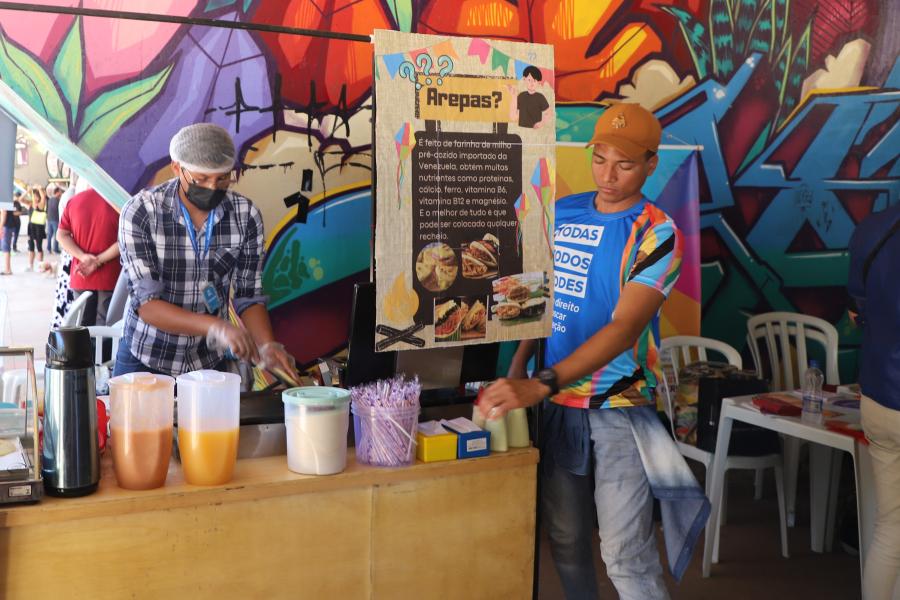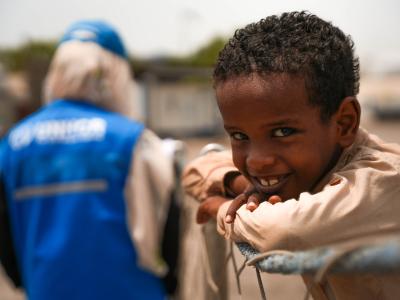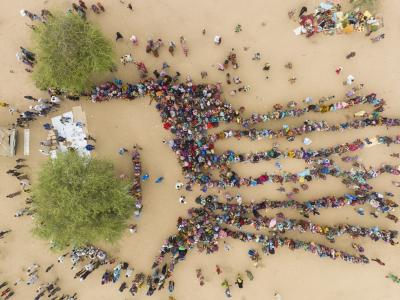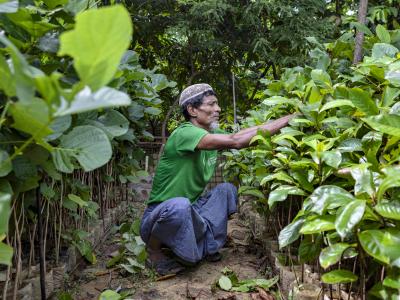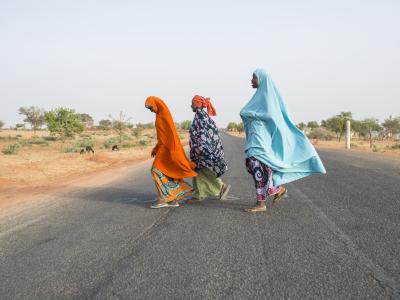Results in 2023
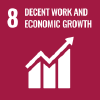
Access to employment and financial services is critical to breaking the cycle of dependency that refugees can find themselves in when they seek safety in a foreign country. 2023 saw some significant improvements in this area. The 2023 Global Compact on Refugees “Indicator report”, with information on 99 countries covering 32 million refugees, showed that 67% of refugees had a legal right to work in 2023, up from 52% in 2021. Although only 45% had such a right in practice, according to UNHCR’s biennial “Global survey on livelihoods and economic inclusion”, that represented a major improvement from 18% in 2019.
The global survey, which drew on data from 132 countries, also showed around 40% of countries offered social protection to refugees, and that over half of refugees globally had a legal right to open a bank account in the country where they had claimed asylum. Increasing numbers of countries granted that legal right. Based on reporting from 54 UNHCR country operations, 44% of refugees and asylum-seekers had an account at a bank, financial institution or mobile money service provider in 2023. That compared to 30% in 2022, based on reports from 51 countries.
Prospects for economic inclusion and social protection got a further boost at the 2023 Global Refugee Forum, which yielded more than 260 pledges on this theme, and more than 40 States made over 80 commitments as part of a multi-stakeholder pledge on economic inclusion and social protection. Commitments from refugee-hosting States need to be matched with technical assistance and financing in order to succeed. There is growing interest among the private sector in enhancing refugee employment, as evidenced by initiatives such as the World Economic Forum’s Refugee Employment Alliance, co-led by UNHCR and Ingka Group, the Private Sector for Refugees initiative of the International Chamber of Commerce, and the TENT Partnership for Refugees, which UNHCR collaborates with.
Examples of economic inclusion in 2023 included UNHCR’s efforts in Uganda, in partnership with the Office of the Prime Minister and district local governments, where 39,000 acres of arable land has been made available to about 38,500 refugee households. UNHCR-supported job-matching platforms are linking refugees with employers and integration services in several countries in Europe, Africa and the Americas, including Brazil, Chile, Cyprus, Ecuador, Ethiopia, Greece, Italy, Peru and Romania. In Romania alone, over 6,500 refugees benefited from employment support through the platform in 2023, while in Italy, the platform is connected to the Welcome network of 700 employers, who have supported over 22,000 refugees since 2017.
The Ministry of Labour of Jordan reported that 90,153 work permits were issued to refugees in 2023, enabling them to access social security and related benefits. Since 2016, over 430,000 work permits have been issued, including renewals, with financial support from the World Bank. Additionally, focusing on self-employment, UNHCR’s partner Jordan River Foundation reported that 85% of micro-businesses supported with seed funding, mentorship and training in the period 2017-2021 remained operating after 3 years and most were profitable.
In Ethiopia, under the World Bank’s Economic Opportunities Program, 14,558 refugees out of a target of 30,000 received either a business licence, a work permit for self/wage-employment or resident permit for joint project employment. The PROSPECTS partnership, implemented by UNHCR, UNICEF, ILO, the World Bank and IFC, created economic opportunities for 129,449 people (38,621 refugees and 90,828 host community members).
In Brazil, UNHCR and partners assisted 9,066 refugees with job placement, self-employment, and entrepreneurship initiatives, including over 655 indigenous people, and the Companies with Refugees Forum, a network of companies committed to expanding the economic inclusion of refugees, grew to over 100 members. In Mexico, UNHCR’s local integration programme internally relocated more than 30,000 refugees and asylum seekers since 2016 and facilitated efficient matching between their profiles and workforce needs of more than 600 private sector companies. 75% of households reported at least one adult accessing employment within the first month of arrival at the destination, increasing to 90% within six months. In El Salvador, the “My First Job” programme provided 1,207 youth with market orientation and 698 of them obtained a formal contract, generating $3.6 million in productivity gains for the national economy.
UNHCR developed a global strategy for livelihoods and economic inclusion for the years 2024-2030, aiming to advance economic inclusion and enhance the resilience of displaced and stateless people through decent work and access to rights and services. It serves as a blueprint for UNHCR’s role within the broader economic landscape, offering diverse, context-specific approaches to economic empowerment towards self-reliance.
A shift to diversified, resilient and sustainable agroecological systems provides opportunities for the inclusion of displaced and stateless people in these systems. GRF pledges for agricultural land and policy easing support this inclusion and food security outcomes. UNHCR’s participation in the Global Network Against Food Crises addresses the link between displacement and food insecurity and offers opportunities to represent refugee participation in global food systems.
A collaboration between UNHCR and the World Bank on insect farming in Zimbabwe, Malawi, and South Sudan offered a sustainable model for nutrition, green job creation, and waste management, with great potential for expansion to more countries in 2024. The collaboration, which began in 2022, has also led to the inclusion of refugees in regular agriculture interventions.
The Joint WFP-UNHCR Hub for Programme Excellence and Targeting helped both agencies to address the needs of forcibly displaced populations more efficiently and effectively in seven countries: the Democratic Republic of the Congo, Egypt, Mauritania, Mozambique, Niger, South Sudan and Uganda. In addition, WFP and UNHCR developed a joint analytical framework to assess the basic needs of displaced populations and inform programmatic interventions, including food, livelihoods/resilience, and multi-purpose cash assistance.
In Uganda, the joint blended finance programme established with Sida and Grameen Credit Agricole Foundation at the end of 2019 has now reached over 120,000 entrepreneurs among the refugee and host community with credit, opening of savings accounts and provision of financial education and business training services.
In 2023, the IFC-UNHCR Joint Initiative assessed financial inclusion in Ecuador, Poland, the Republic of Moldova and Romania, and facilitated banking sector engagement in Poland, Georgia and the Republic of Moldova. The Joint Initiative also aided the IFC in launching a $17 million loan programme with Santander Bank Polska, allowing the bank to free up capital and issue $100 million in new loans for refugee-owned and refugee-supporting businesses in Poland.
Despite strong evidence of progress on economic inclusion, refugees remained very vulnerable and exposed to the risk of economic downturns. In 2023, 54 UNHCR country operations gathered data on the numbers of refugees and asylum-seekers who reported a positive change in their income compared to the previous year. 41 reported that less than 25% of refugees and asylum-seekers reported a positive change in their income in 2023. (In 2022, 34 out of 49 countries had reported the same.) For 11 countries reporting data on internally displaced people in 2023, the results were even starker: in every country, less than a quarter of IDPs reported a positive change in their income.
Core indicators

13.1 Proportion of people with an account at a bank or other financial institution or with a mobile-money-service provider

13.2 Proportion of people who self-report positive changes in their income compared to the previous year
Financial overview
Global expenditure and budget for Self-reliance, economic inclusion and livelihoods
$178 million spent against a budget of $525 million
$347 million of unmet needs or 66% of the budget
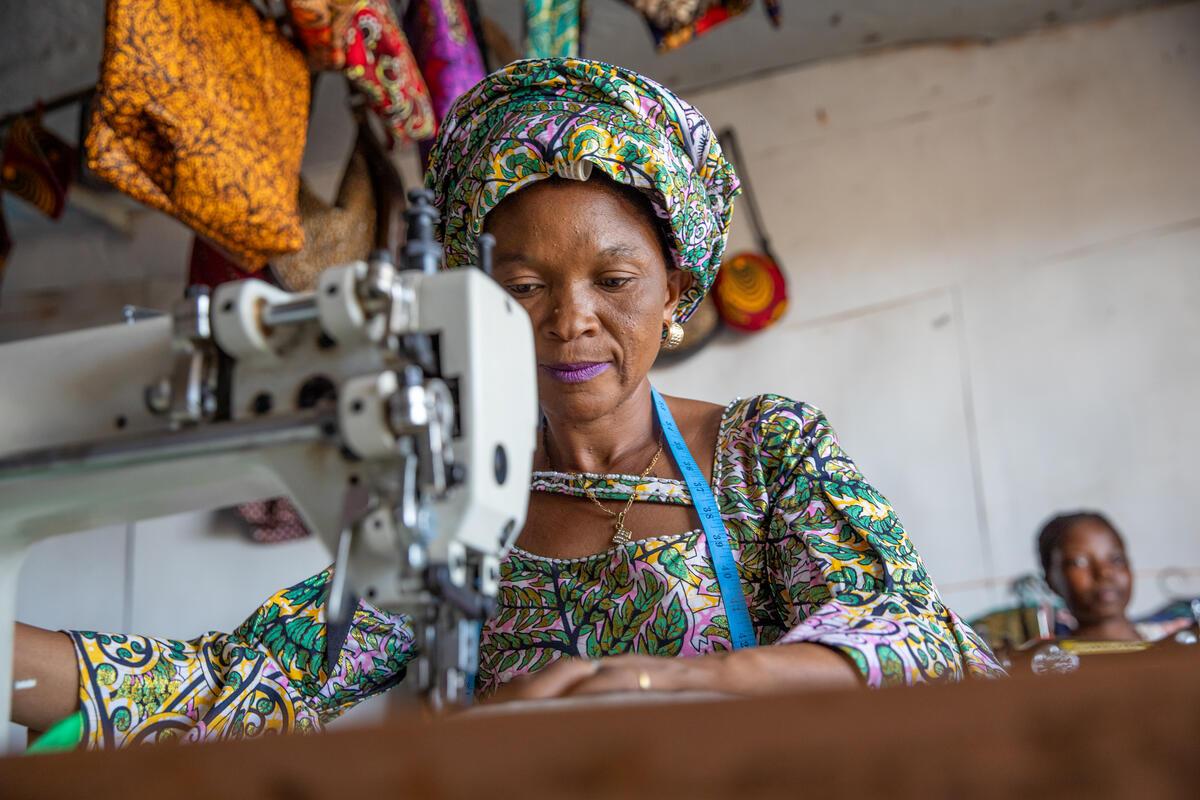

Action for refugee inclusion: the World Economic Forum and UNHCR
UNHCR and the World Economic Forum (WEF) bring governments, businesses, academia and civil society together to channel support towards refugee crises, from the moment people are forced to flee until the end of their displacement. The WEF’s Humanitarian and Resilience Investing Initiative aims to catalyse investment in frontier markets, including refugee-hosting areas. In 2023, UNHCR joined the WEF’s call to action to mobilize $10 billion in commercial and catalytic capital to enable 1,000 businesses to scale up in frontier markets by 2030. Between its launch in May 2022 and conclusion in January 2024, the Refugee Employment Alliance (co-chaired by WEF, UNHCR and Ingka Group), resulted in the direct employment of 54,000 refugees by WEF member companies and a target to secure jobs for another 125,000 refugees by 2027. The Alliance enabled like-minded businesses to learn from efforts to integrate Ukrainian refugees into the labour market and to encourage refugee employment, through best practice publications and a Strategic Intelligence Map. By joining forces, UNHCR and WEF are ensuring that the private sector’s expertise, influence and resources contribute to the search for solutions.
